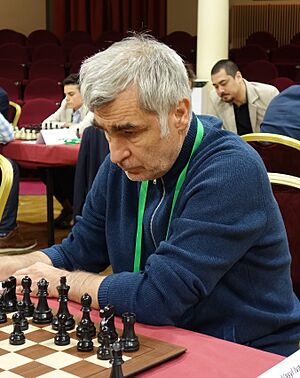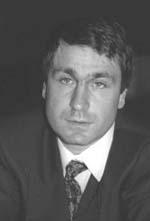Vasyl Ivanchuk facts for kids
Quick facts for kids Vasyl Ivanchuk |
|
|---|---|

Ivanchuk in 2023
|
|
| Country |
|
| Born | March 18, 1969 Kopychyntsi, Ukrainian SSR, Soviet Union |
| Title | Grandmaster (1988) |
| FIDE rating | 2678 (February 2026) |
| Peak rating | 2787 (October 2007) |
| Peak ranking | No. 2 (July 1991) |
Vasyl Ivanchuk (born March 18, 1969) is a famous Ukrainian chess player. He is known as a Grandmaster, which is the highest title a chess player can get. He earned this title from FIDE (the International Chess Federation) in 1988.
Since 1988, Ivanchuk has been one of the best chess players in the world. He was ranked as high as No. 2 globally three times. He has won many important tournaments, including Linares, Wijk aan Zee, Tal Memorial, and Gibraltar Masters. He also won the World Blitz Championship in 2007 and the World Rapid Championship in 2016.
Contents
Chess Career
Starting Out
Vasyl Ivanchuk was born in Kopychyntsi, Ukraine. He started showing his amazing talent early on. In 1987, he won the European Junior Chess Championship. The next year, he gained international attention by winning the New York Open. He tied for first place in the 1988 World Junior Chess Championship. He officially became a Grandmaster in 1988 and quickly entered the top 10 chess players worldwide.
Becoming a Top Player
Ivanchuk won the Linares tournament three times: in 1989, 1991, and 1995. The 1991 Linares tournament was very special. Eight of the fourteen players were among the world's top ten, including the then-world champion, Garry Kasparov. Ivanchuk won the tournament, even beating Kasparov in their game.
Many people thought Ivanchuk would become the world champion. He came very close in 2002 when he reached the final of the FIDE World Chess Championship 2002. He was a top 10 player for many years, from 1988 to 2002. Even though he was incredibly talented, he sometimes struggled under pressure. This might have stopped him from winning the world championship. For example, in the 2002 FIDE championship final, he was expected to win after beating the defending champion. However, he lost to his countryman Ruslan Ponomariov in a big surprise.
Ivanchuk also played in the 2013 Candidates Tournament in London. This tournament decides who gets to challenge the world champion. He finished seventh, but he had a big impact. He managed to defeat both of the top players, Magnus Carlsen and Vladimir Kramnik. This helped Carlsen qualify for the World Chess Championship.
In 2016, Ivanchuk won the World Rapid Chess Championship in Doha, Qatar. He scored 11 out of 15 points, beating many strong players, including Magnus Carlsen.
Beyond Chess
In July 2016, Ivanchuk started playing checkers (also known as draughts). He has become quite good at it! He even reached a high ranking in the World Draughts Federation database.
Playing Style
Vasyl Ivanchuk has a very special and brave way of playing chess. He is known for his amazing creativity and strong technical skills. He often creates unusual situations on the board. Ivanchuk is famous for his imaginative moves, sometimes making surprising sacrifices. These moves come from deep and complex calculations.
Many other chess players and experts consider Ivanchuk a chess genius. Garry Kasparov once said that Ivanchuk played at a level equal to a world champion, even though he never held the title.
Personality and Impact
In 2013, chess player Gawain Jones called Ivanchuk "possibly the most talented [player] ever." When asked to name chess geniuses, Judit Polgár, another famous player, mentioned only Ivanchuk, Carlsen, and Anand.
Viswanathan Anand, a former world champion, has called Ivanchuk the most unique player in chess. Anand said that Ivanchuk is very smart but can be unpredictable. Sometimes he is very friendly, and other times he might seem to ignore people. Players sometimes joke that he lives on "Planet Ivanchuk" because of his unique ways.
Ivanchuk's playing style is also unpredictable and very original. This makes him a dangerous opponent, but sometimes it can also lead to quick losses.
In 2008, Ivanchuk played for Ukraine in the Chess Olympiad. After a tough loss in the final round, which caused his team to miss out on a medal, he was very upset. There was a misunderstanding about a required test, but it was later cleared up.
After some difficult tournaments in 2009, Ivanchuk briefly announced he would stop playing professional chess. However, he soon changed his mind and continued his career.
Major Tournament Wins
Ivanchuk has won many important chess tournaments throughout his career. Some of his notable victories include:
- Linares (1989, 1991, 1995, shared 2009)
- Wijk aan Zee (1996)
- European Individual Chess Championship (2004)
- World Blitz Chess Champion (2007)
- M-Tel Masters (2008)
- Tal Memorial (2008)
- Gibraltar (2011)
- World Rapid Championship (2016)
- Capablanca Memorial (multiple times: 2010, 2011, 2012, 2016, 2019)
Team Chess Achievements
Ivanchuk has been very successful in team chess competitions. He has played in 14 Chess Olympiads, which are like the Olympics for chess. He played twice for the Soviet Union and twelve times for Ukraine after it became an independent country.
He has won a total of thirteen medals in these events. His teams have won four gold medals: with the USSR in 1988 and 1990, and with Ukraine in 2004 and 2010. He has also won silver and bronze medals for his team and for his individual performance on his board.
Notable Games
- Ivanchuk vs Kasparov, Linares 1991
In this game from 1991, a 21-year-old Ivanchuk played against Garry Kasparov, who was the world champion at the time. Ivanchuk made some bold moves, giving up two of his bishops for knights. He then managed to trap Kasparov's pieces, leading to a strong win.
Personal Life
Vasyl Ivanchuk was married to Alisa Galliamova, who is also a chess player. He later married for a second time in 2006.
In 2011, Ivanchuk and his second wife experienced an upsetting incident while traveling in Brazil. Despite this, his wife encouraged him to continue playing in a chess tournament he was leading.
Awards and Honors
Ivanchuk has received several important awards and honors from Ukraine for his achievements:
- (5th and 4th class)
- (2nd and 1st class)
See also
 In Spanish: Vasili Ivanchuk para niños
In Spanish: Vasili Ivanchuk para niños
 | James B. Knighten |
 | Azellia White |
 | Willa Brown |



